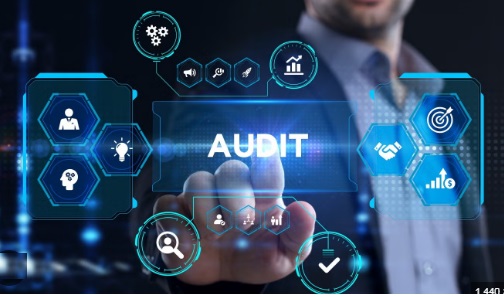Stories you may like
What is an AI Auditor?
An AI auditor examines artificial intelligence systems to ensure they operate correctly and fairly. As AI becomes more integrated into daily life, there is a growing need to verify that these systems make decisions in a reliable and unbiased way. AI auditors help build trust in AI by ensuring that its use aligns with ethical standards and regulatory requirements.
The role of AI auditors is becoming increasingly important as AI is used in industries like healthcare, finance, and hiring. People rely on AI to assist with decisions that can have major consequences, such as loan approvals or medical diagnoses. If an AI system is not functioning properly or is unfairly favoring one group over another, it can create serious problems.
What does an AI Auditor do?
Duties and Responsibilities
AI auditors help organizations identify risks, improve transparency, and maintain trust in AI technologies. Here are some common duties and responsibilities of AI auditors:
- AI System Evaluation: Review AI models to ensure they function correctly, produce reliable results, and do not have biases that could lead to unfair outcomes.
- Compliance and Regulation Checks: Ensure AI systems follow legal requirements, industry standards, and ethical guidelines to prevent misuse or unintended harm.
- Bias and Fairness Analysis: Examine AI decision-making processes to identify and reduce potential biases that could unfairly impact certain individuals or groups.
- Security and Privacy Assessment: Assess AI systems for vulnerabilities that could expose sensitive data or be exploited by cyber threats.
- Transparency and Explainability Testing: Verify that AI models provide clear and understandable explanations for their decisions, making it easier for users to trust and interpret their results.
- Risk Identification and Mitigation: Identify potential risks associated with AI use, such as errors, misuse, or unintended consequences, and recommend solutions to address them.
- Reporting and Documentation: Create detailed reports outlining findings, risks, and suggested improvements to help organizations refine their AI technologies.
- Collaboration with Stakeholders: Work with developers, policymakers, and compliance teams to improve AI systems and ensure they align with ethical and legal standards.
Types of AI Auditors
There are different types of AI auditors, each specializing in evaluating AI systems for specific risks and compliance needs.
- Ethical AI Auditor: Focuses on ensuring AI systems align with ethical principles, such as fairness, transparency, and accountability. They assess AI for biases, unintended consequences, and potential societal impacts.
- Regulatory Compliance AI Auditor: Examines AI systems to ensure they meet legal and industry regulations. They review AI usage against privacy laws, consumer protection rules, and sector-specific guidelines, such as healthcare or finance regulations.
- Security AI Auditor: Evaluates AI systems for cybersecurity risks, ensuring they are protected against hacking, data breaches, and other security threats. They check for vulnerabilities that could be exploited by bad actors.
- Bias and Fairness AI Auditor: Specializes in detecting biases in AI decision-making processes. They analyze datasets and algorithms to prevent discrimination against certain groups and ensure fair outcomes.
- Operational AI Auditor: Reviews AI performance to verify its accuracy, reliability, and efficiency. They test AI models to ensure they work as expected in real-world scenarios and identify areas for improvement.
- Corporate AI Auditor: Works within companies to assess internal AI systems for ethical risks, security concerns, and compliance with company policies. They help businesses maintain trustworthy AI practices while minimizing risks.
What is the workplace of an AI Auditor like?
The workplace of an AI auditor depends on the industry they work in, but it is typically an office, research lab, or corporate setting. Many AI auditors work for technology companies, government agencies, or consulting firms that focus on AI regulations and security. Some work for financial institutions, healthcare organizations, or universities, ensuring AI systems in these fields are safe and reliable. With the rise of remote work, many AI auditors also have the flexibility to work from home or in a hybrid environment.
AI auditors often collaborate with different teams, including AI developers, legal experts, and ethics committees. Their work may involve reviewing AI models, analyzing reports, and attending meetings to discuss findings and recommendations. Depending on their role, they may also visit company offices, research facilities, or government institutions to conduct audits and ensure AI systems comply with laws and best practices.
Since AI is constantly evolving, AI auditors need to stay updated on the latest developments, regulations, and security risks. Many workplaces encourage ongoing learning, so AI auditors may participate in training programs, attend AI policy conferences, or join professional organizations.
How to become an AI Auditor
Becoming an AI auditor requires a mix of technical knowledge, regulatory expertise, and analytical skills to evaluate artificial intelligence systems for fairness, security, and compliance. Here are the key steps to becoming an AI auditor:
- Earn a Relevant Degree: Start by pursuing a degree in fields such as computer science, data science, cybersecurity, or law. A background in artificial intelligence or ethics can also be helpful in understanding how AI systems function and the rules governing their use.
- Gain AI Knowledge and Technical Skills: Develop a strong understanding of AI, machine learning, and data analysis by taking courses or certifications. Learning programming languages like Python and becoming familiar with AI auditing tools can help build the technical skills needed for this role.
- Understand AI Regulations and Ethics: AI auditors must be knowledgeable about laws and ethical guidelines surrounding AI use. Studying topics like data privacy, bias in AI, and security risks will provide valuable insights into AI governance and compliance.
- Build Experience in AI Auditing or Compliance: Look for opportunities to work in fields related to AI oversight, risk management, or cybersecurity. Entry-level roles in compliance, IT auditing, or AI ethics can provide hands-on experience in evaluating AI systems and identifying risks.
- Obtain Relevant Certifications: Earning certifications in AI governance, security, or compliance can boost your qualifications. Some valuable options include Certified Information Privacy Professional (CIPP), Certified Ethical Hacker (CEH), and AI governance certifications from leading institutions.
- Stay Updated and Network: AI is rapidly evolving, so staying informed about new regulations, security threats, and AI best practices is essential. Attending AI conferences, joining professional organizations, and connecting with experts in AI auditing can help advance your career.
Certifications
Earning relevant certifications can help AI auditors build expertise in AI governance, security, and compliance. Here are some key certifications:
- Certified Information Privacy Professional (CIPP/US): Offered by the International Association of Privacy Professionals (IAPP), this certification covers U.S. privacy laws and regulations, including AI-related data protection.
- Certified Ethical Hacker (CEH): Provided by the EC-Council, this certification focuses on cybersecurity and ethical hacking, helping AI auditors assess security risks in AI systems.
- Certified Information Systems Auditor (CISA): Issued by ISACA, this certification is designed for professionals who audit, control, and monitor information technology systems, including AI applications.
- AI Governance and Risk Management Certificate: Offered by various universities and institutions, this certification covers AI governance frameworks, compliance standards, and risk mitigation strategies.
- MIT AI and Ethics Certification: A program that explores the ethical considerations and policy implications of AI, helping auditors assess fairness and bias in AI systems.
- Stanford AI Governance and Policy Program: Focuses on AI regulation, transparency, and accountability, providing AI auditors with an understanding of emerging policies and ethical challenges.
Skills of an AI Auditor
An AI auditor has advanced knowledge of AI technologies, including:
- Machine learning algorithms
- NLP (natural language processing) and;
- Computer vision
They also have knowledge of data analysis methods and programs and are experienced with basic coding such as Python or R.
AI auditors have excellent analytical thinking, and are accountable, disciplined and ethical. They also have strong problem-solving skills and are able to manage their time effectively.
What are the skills of an AI auditor?
- Knowledge of AI technologies like ML algorithms and NLP
- Knowledge of data analysis methods and programs
- Experience with basic coding such as Python or R
- Knowledge of cybersecurity principles
- Familiarity with data privacy laws and regulations
- Basic knowledge of human-centred design principles
- Familiarity with auditing frameworks
- Excellent analytical thinking
- Ability to be accountable
- Strong discipline and ethics.
- Strong problem-solving skills
- Excellent time management skills
- Desire to stay up-to-date on AI systems advancements
Salary of an AI Auditor
An AI auditor makes approximately $95,000 per year on average in the US. Entry-level positions can offer around $70,000 whereas more senior positions can offer close to $120,000 per year.
In Germany, AI auditors make around €55,000 – €96,000 whereas in the UK, the salary range is around £56,000 – £73,000 per year.
Note that these salaries can vary depending on your location, skill set, position and level of experience.





User's Comments
No comments there.